- Home
- Jack Canfield
Chicken Soup for the Pet Lover's Soul Page 22
Chicken Soup for the Pet Lover's Soul Read online
Page 22
“You silly, pweshus baby,” I said, laughing and cuddling him to me.
Now the rules are gone. I never had the authority anyway. Only love and the babbling remain. Does anyone know of a Babblers Anonymous?
Kathleen M. Muldoon
“Was it a ’ittle putty tat?
’es it was. It was a putty!
Tum tum tum!
Tum on, pwetty putty, tum det on Mommy’s wap.”
Drawing by Booth. ©1974 The New Yorker Magazine, Inc.
A Damaged Dog
A jarring cry roused me from my sleep early one Friday morning. Running to my window, I saw what I expected— the canine victim of yet one more hit-and-run driver. The gaunt, wolf-like creature lay huddled against a doorway. I knew there was no owner. The dog was clearly one of the many homeless, hungry mutts prowling the streets of Kiev, where I was temporarily working as a journalist.
Perhaps he isn’t too badly injured, I hoped vainly. But when he tried to walk, he kept falling on his hurt shoulders, leaving a blood-soaked path on the pavement behind him. He could be dangerous, I worried. Wrong again. He kept nudging passersby with his head in an obvious plea for help.
In no time, I was one of a small group of people surrounding the shocked animal, debating what could be done. “I’ll take him,” I said, startled by my own words. “Temporarily.”
Someone brought out a bed sheet, and I smiled as the dog immediately tried to roll himself onto it. My neighbor, Yelena, volunteered her services and we soon drove around in her car, from one primitive clinic to another. The recommended treatment was a merciful death. The bone in one of the dog’s legs was shattered and no one had the facilities, skills or medication to treat him. Ukraine in 1992 was a cash-strapped country.
The dog looked at me plaintively, his eyes glazed from the effects of morphine. I became determined, with an advantageous wad of American dollars in my pocket, to save this creature’s life. “Surely something can be done,” I said.
“If anyone can do anything, it’s Oleg Feodoseyevych, a professor at the Agriculture Academy. He’s the best veterinary surgeon this country has,” I was told. Yelena and I were soon carrying our canine patient through a stable of pigs and cows into a large teaching surgery full of giggling students in funny white paper caps. The famed Oleg Feodoseyevych gingerly felt around the dog’s body, smiled, and said the magic words: “He’ll be all right.”
The operation lasted four hours, and I watched as the professor patiently inserted a metal rod into one of the dog’s legs. The dog, awake throughout, yelped whenever the local anesthetic started to wear off. “He needs more anesthetic,” someone would volunteer. Usually it was me.
Just minutes after the operation, we were back in the car, the dog with two new white casts, and me with a sheet of instructions on post-operative care and medicine to buy. Where was I supposed to get gauze or painkillers in a city whose pharmacies carried little more than vitamins and herbal teas?
“Don’t worry,” said Yelena. “The pharmacies are empty but home medicine cabinets are full.” Sure enough, Yelena came over that evening with a bag full of vials, tubes, syringes and tablets.
For three days and nights my sick patient groaned, lying motionless on a blanket. He moved nothing but his tail, which thumped loudly against the parquet floor each time I entered the room. I fed him chicken soup through an eyedropper. Six times a day I changed the bandages over a partial opening in the casts, causing him obvious pain as the gauze ripped his bloody shaven skin.
Foolishly hoping he perhaps had an owner, I placed ads in the local papers. I received many calls, but none from a long-lost master. Several people offered to adopt him, and I began compiling a list of possible owners for the day he would be recovered.
Before long the dog was ready for solid food, and I called my cleaning woman, Nadia, in a panic over what to feed him—Western-style commercial dog food was not yet available in Ukraine. Chubby Nadia, dog-lover extra-ordinaire, soon stood at my stove, brewing a concoction of mashed potatoes, carrots and chopped beef. She instructed me, who had never owned a dog, on the basics of dog care.
Eventually my patient started walking and I ventured outside with him after carrying him down the final twenty steps of my building. Teetering along on his two plastered legs, tail wagging, he was met with a wave of sympathy. Grannies on their balconies shook their heads, making little tsk-tsk sounds, children jumped around us asking if it would hurt to pet his head, and every dog owner in sight stopped to offer his favorite canine home remedy for broken bones.
“Eggshells,” said one woman, who ran half a block to tell me this.
Finally the day came when Oleg Feodoseyevych arrived to remove the casts. We heaved the dog into the bathtub, and I held him as the doctor cut away the plaster.
“You know, a dog has to have a name,” he said.
“Oh, no,” I answered, waving the list of potential owners at him. “I’m not planning on keeping him. You can see, my lifestyle, the traveling I have to do . . .”
The good doctor looked up, and smiled.
Olivier, as I came to name him, never did leave. He fully recovered and showered me with his love, repaying me tenfold for my spontaneous decision that traumatic Friday morning. Many a day he pulled me away from my solitude, anger, laziness and greed. He gave me exquisite sunrises over the river Dnieper at the break of dawn, introduced me to endless people in the park, and enchanted me for hours as I watched his ridiculous antics with his four-legged friends. He covered me with wet sappy kisses and warmed me with big howling welcomes.
Did I save him, I wondered, or did he save me?
Two years later, Olivier left as abruptly as he arrived. One day, while playing with his favorite dog pal in the park, he fell over, convulsed, and died. A subsequent autopsy showed a ruptured liver enlarged to twice its size. He had no chance, the doctor said, a woman who was another specialist from the Agriculture Academy. Olivier had plenty of other internal problems, she said, as a result of years of impoverished living on the streets of Kiev.
Seeing my distress, she tried to comfort me in the typical gruff Slavic manner. “You know, you shouldn’t just pick up any old dog off the street. They’re too damaged to live long. It’s just not worth the emotional cost.”
And what of the emotional gain? I wondered, considering her words.
As I stepped out of the clinic, I resolved never to heed her advice.
Roma Ihnatowycz
A French Cat
Recently my husband Gene and I traveled throughout Europe. We rented a car as we always do and drove along the back roads, staying in quaint, out-of-the-way inns. The only thing that distracted me from the wonder of the trip was the terrible longing I felt for our cat Perry. I always miss him when we travel, but this time, because we were gone for more than three weeks, my need to touch his soft fur and to hold him close became more and more intense. With every cat we saw, the feeling deepened.
We were high in the mountains of France one morning, packing the car before resuming our trip, when an elderly couple walked up to the car parked next to ours. The woman was holding a large Siamese cat and speaking to him in French.
I stood watching them, unable to turn away. My yearning for Perry must have been written all over my face. The woman glanced at me, turned to speak to her husband and then spoke to her cat. Suddenly she walked right over to me and, without one word, held out her cat.
I immediately opened my arms to him. Cautious about the stranger holding him, he extended his claws, but only for a few seconds. Then he retracted them, settled into my embrace and began to purr. I buried my face in his soft fur while rocking him gently. Then, still wordless, I returned him to the woman.
I smiled at them in thanks, and tears filled my eyes. The woman had sensed my need to hold her cat, the cat had sensed that he could trust me, and both, in one of the greatest gifts of kindness I have ever received, had acted upon their feelings.
It’s comforting to know the language
of cat lovers—and cats—is the same the world over.
Jean Brody
“I’m afraid we’ll have to keep him overnight.
Are you going to need a loaner?”
Mike Twohy ©1994 from The New Yorker Collection. All Rights Reserved.
Tailless Tom
Tailless Tom has been gone a long time now, but I still see him in my mind’s eye as clear as if he had died only yesterday. I see him strutting along proud as punch, his rear end with only the tiniest stump of tail on it twitching in the breeze. I like to think of Tailless Tom as my cat, which he was, but he wasn’t . . . the way the Statue of Liberty belongs to me, but it doesn’t. The truth is that Tailless Tom belonged to a whole regiment, and I think every man in that regiment belonged to him.
Tailless Tom’s proud way of walking might make you think he was a Manx cat, but he wasn’t. He was just an ordinary brown alley cat who had lost his tail—he never told me how—in his early years before we met. That was back in the early 1930s, when I first opened my animal hospital in Mount Vernon, New York.
Tom lived near the hospital with a nice but terribly squeamish lady. She couldn’t stand the things Tom brought home from his daily outings in the fields that used to be plentiful around Mount Vernon.
Because he was such a friendly, gregarious cat who seemed to truly like people, Tom dropped in on me one day and I showed him around my hospital, which stood clean and empty while I waited for customers to discover me.
Shortly afterward, I met the lady with whom he lived. She dropped in for some advice about Tom. Was there any way she could stop him from bringing home the mice, moles and birds he caught?
“He puts them right at my feet, Dr. Camuti, and sometimes they’re still alive!”
I told her she should feel complimented. And she should be proud that her cat was such a good hunter. She sniffed at that, and dabbed at her eyes with a lacy handkerchief. “Well, I can’t stand it. I’m a very nervous woman and I find it upsetting.”
The woman knew that I thought Tailless Tom was a terrific cat. That was why she called me a week later. She sounded close to hysteria.
“Do you want Tom? He’s yours right now. I can’t take it anymore.”
“What happened?”
Her voice rose, and the words came tumbling out in a wild rush. “Do you know where he is this very minute? Sitting outside the screened porch door with a snake in his mouth, and it’s still alive! You have to come and get him right away, Dr. Camuti, or I’ll find some other way to get rid of him. I can’t have this happening anymore!”
I said I’d be right over. Sure enough, Tom was sitting exactly where she said he was. The snake turned out to be a racer, absolutely harmless and a baby, not much larger than a big worm. Tom dropped it at my feet. I patted his head, and the snake shot off into the grass.
I brought Tom back with me to the hospital. He immediately sensed it was his new home. I told Tom that the hospital would have to be a temporary home for him because as my practice grew, the hospital was bound to fill up with all sorts of animals, and a cat in residence just wouldn’t work out. I told him that I would certainly do my best to find him a good, permanent home. Tom said nothing. He just rubbed against my pants leg and purred.
With his personality, I thought I’d have no trouble finding a home for Tailless Tom. People seemed interested when I told them about the cat’s warm, friendly disposition, but when I got to the part about his talents as a hunter, I lost many of them. And the one or two that asked to meet Tom didn’t seem to find this tailless wonder as attractive as I did.
One day, I thought of a perfect solution. I was the commanding officer at the White Plains Armory on South Broadway. There were lots of people around over there, and Tom liked people. It would be a great home for him. There were plenty of open fields around the place, so Tom would have good hunting.
Tom took to army life like a duck to water, and the men fell for him. One of the sergeants made him his own dog tag and put it on a chain around his neck. Wearing the proof of how special he was, Tom strutted more proudly than ever.
Tom’s favorite time was when the 102nd Medical Regiment moved out to Camp Smith, near Peekskill, New York, for two weeks each summer. As a member of the regiment, Tom naturally went along.
As commanding officer of the service command at Camp Smith, one of my duties was to supply the food to the thirteen companies in the regiment. All the supply sergeants tried to give special treats to Tom as a way of pleasing me, but Tom let them know he couldn’t be bought. He would just turn up his nose and march on.
Though he wasn’t officially assigned to the post, Tom made mess hall inspection his job. It was a big undertaking, since there were eleven mess halls for the enlisted men and two for the officers, all strung out in a 400-foot line. Tom dropped by many of the halls two or three times a day to look things over. Obviously he had his favorite kitchens, and the men who ran them felt honored by Tom’s visits. Those he ignored tried desperately to lure him over, as though Tailless Tom was in charge of bestowing some terrific award, like the Duncan Hines Seal of Approval.
Tom actually made the whole camp his command, but he would always check in at my company several times a day just to give me a rub and a purr and let me know that I still stood high in his affection. But he refused to sleep in my officer’s tent. Tom was a born diplomat. He always bedded down with the enlisted men.
When we returned from Camp Smith, Tom went back to hunting the open fields around the armory. No matter how far he wandered, he always kept the armory in his sights, and the minute he saw men gathering for a meeting, he came racing back.
Life went on for Tom at the armory for several years. And then one day, coming back from one of his field patrols, he was run over by a car right in front of the armory. It was a loss every man felt.
There was no question about Tom’s funeral. It was automatically decided that he should have a full military send-off.
I don’t think there was one man attached to the armory who skipped Tom’s funeral. He was placed in a small casket and buried in the front yard of the armory while a military salute was fired in his honor and taps was sounded. I looked down the line of men standing at attention as Tailless Tom went to his glory, and I could see the sun picking up wet spots on many faces. I admit the tears were running freely down my face.
Today there is a small marker on Tailless Tom’s grave in the front yard of the armory. When I’m out driving, I often stop to pause a minute and look at Tom’s grave and remember him. I can still hear the sound of his dog tag rubbing against the chain around his neck as he strutted around with his stump of tail high in the air, and all four feet marching in proud cadence. He was a great cat and a good soldier.
Louis J. Camuti, D.V.M.
The White House Dog
My name is Mildred Kerr Bush and I came to live with the Bush family on February 13, 1987. Their previous dog, C. Fred Bush, had died on January 20, and George, who was then Vice President of the United States of America, knew that his wife, Bar, missed C. Fred and needed a dog. But he also knew that Bar did not need a puppy.
“Training puppies on your own rugs is a challenge. Training pups on government rugs is impossible.”
So George turned to his great friend Will Farish. Bar had fallen in love with my mother and sister in South Texas when she and George had joined Will and Sarah there on a trip after Christmas. Sarah had mentioned that my mother had had a big litter. So George called Will, who said he was sure that he had a dog, and called back later to ask if a girl would be all right. The Bushes had never had a female dog before, but George said, “That would be great.” Will said he had the perfect dog . . . but she was liver-colored and white, not black and white like her beautiful mother and sister. George said, “Fine.”
Will brought me from Versailles, Kentucky, to Cincinnati, where we met the Bushes at the foot of the steps of Air Force II. It was love at first sight. Both Bushes kissed me and I sat on Bar’s lap all the w
ay home. I’m going to be honest (this is a confession that is difficult for me to make and you will understand why as you read on). Bar did whisper to me that night, “You are so sweet, but you are so ugly. You have a pig’s nose, you are bowlegged, and your eyes are yellow.” I knew immediately that I was going to have to try harder. She also told me that she really loved me, and I believed her.
That was sort of a rocky start, but I have since heard her tell others that she will never have a male dog again, and that I am the best dog they ever lived with. I believe that too.
Being a vice-president’s dog does have its perks. You often get to meet celebrities. Several months after I arrived at the V.P. House we got a letter from Benji, the famous dog movie actor, asking if he could come by for a courtesy call. He was on a tour promoting his latest movie. You can imagine my excitement . . . I would get to meet a real live macho movie star. We invited two of the “grands,” Jenna and Barbara, to bring over their Horace Mann kindergarten class to see the famous fella. He drove up in a big limousine, surrounded by aides, leaped out on command (as Bar pointed out), and then I discovered the awful truth. Benji turned out to be an aging (twelve-year-old) female. To add insult to injury, she also turned out to be the nicest, best-behaved, friendliest dog I have ever met. The next day the papers had a big article and picture of Benji visiting the U.S. Marine barracks with the Marine mascot. I was barely mentioned. Not that I cared.
I’ve learned publicity is a double-edged sword. My babies and I were once on the cover of Life magazine. I could only conclude that I was their selection for 1989 Mother of the Year. The babies and I looked smashing. I was glad to have a family picture before they all took off for new homes. If only the puppies’ father, Tug, had been with us.
Just when I was riding high, out of the blue and with absolutely no provocation, the July 1989 issue of The Washingtonian magazine came out with their “Best & Worst” list. Guess whose picture was on the cover? Mine! Guess which I was . . . best or worst? Worst. The President advised me to “shake it off,” ignore it, and not let it get my goat.

 Chicken Soup for the Nurse's Soul: Second Dose
Chicken Soup for the Nurse's Soul: Second Dose Chicken Soup for the Ocean Lover's Soul
Chicken Soup for the Ocean Lover's Soul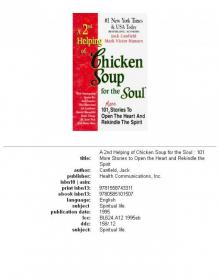 A 2nd Helping of Chicken Soup for the Soul
A 2nd Helping of Chicken Soup for the Soul Chicken Soup for the Nurse's Soul
Chicken Soup for the Nurse's Soul Chicken Soup for the Breast Cancer Survivor's Soul
Chicken Soup for the Breast Cancer Survivor's Soul Chicken Soup for the Pet Lover's Soul
Chicken Soup for the Pet Lover's Soul Chicken Soup for the Bride's Soul
Chicken Soup for the Bride's Soul A Chicken Soup for the Soul Christmas
A Chicken Soup for the Soul Christmas Chicken Soup for the Soul of America
Chicken Soup for the Soul of America Chicken Soup for the Teenage Soul on Tough Stuff
Chicken Soup for the Teenage Soul on Tough Stuff A Taste of Chicken Soup for the Teenage Soul III
A Taste of Chicken Soup for the Teenage Soul III Chicken Soup for Every Mom's Soul
Chicken Soup for Every Mom's Soul Chicken Soup for the Dog Lover's Soul
Chicken Soup for the Dog Lover's Soul A Second Chicken Soup for the Woman's Soul
A Second Chicken Soup for the Woman's Soul Chicken Soup for the Soul the Book of Christmas Virtues
Chicken Soup for the Soul the Book of Christmas Virtues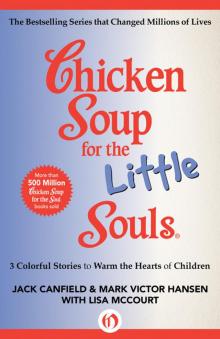 Chicken Soup for the Little Souls: 3 Colorful Stories to Warm the Hearts of Children
Chicken Soup for the Little Souls: 3 Colorful Stories to Warm the Hearts of Children Chicken Soup for the African American Woman's Soul
Chicken Soup for the African American Woman's Soul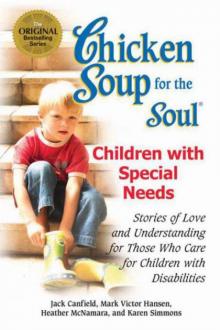 Chicken Soup for the Soul
Chicken Soup for the Soul Chicken Soup for the Soul Celebrates Teachers
Chicken Soup for the Soul Celebrates Teachers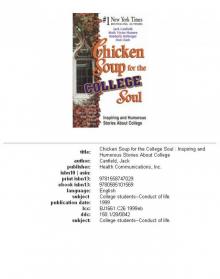 Chicken Soup for the College Soul
Chicken Soup for the College Soul Chicken Soup for the Recovering Soul Daily Inspirations
Chicken Soup for the Recovering Soul Daily Inspirations Chicken Soup for the Soul Celebrates Sisters
Chicken Soup for the Soul Celebrates Sisters Chicken Soup for the Dieter's Soul
Chicken Soup for the Dieter's Soul Chicken Soup for the Soul at Work 101 Stories of Courage
Chicken Soup for the Soul at Work 101 Stories of Courage Chicken Soup for the Beach Lover's Soul
Chicken Soup for the Beach Lover's Soul Stories About Facing Challenges, Realizing Dreams and Making a Difference
Stories About Facing Challenges, Realizing Dreams and Making a Difference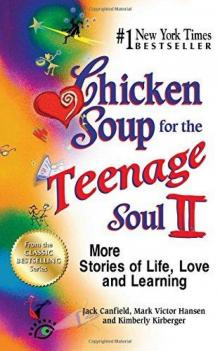 Chicken Soup for the Teenage Soul II
Chicken Soup for the Teenage Soul II Chicken Soup for the Girl's Soul
Chicken Soup for the Girl's Soul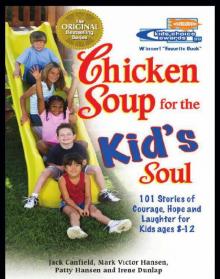 Chicken Soup for the Kid's Soul: 101 Stories of Courage, Hope and Laughter
Chicken Soup for the Kid's Soul: 101 Stories of Courage, Hope and Laughter Chicken Soup for the Woman's Soul
Chicken Soup for the Woman's Soul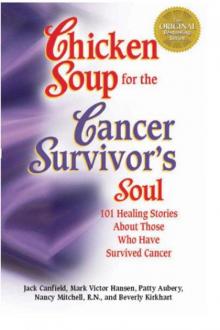 Chicken Soup for the Cancer Survivor's Soul
Chicken Soup for the Cancer Survivor's Soul Chicken Soup for the Canadian Soul
Chicken Soup for the Canadian Soul Chicken Soup for the Military Wife's Soul
Chicken Soup for the Military Wife's Soul A 4th Course of Chicken Soup for the Soul
A 4th Course of Chicken Soup for the Soul Chicken Soup Unsinkable Soul
Chicken Soup Unsinkable Soul Chicken Soup for the Soul: Christmas Magic
Chicken Soup for the Soul: Christmas Magic Chicken Soup for the Grandma's Soul
Chicken Soup for the Grandma's Soul Chicken Soup for the Soul: All Your Favorite Original Stories
Chicken Soup for the Soul: All Your Favorite Original Stories Chicken Soup for the Expectant Mother's Soul
Chicken Soup for the Expectant Mother's Soul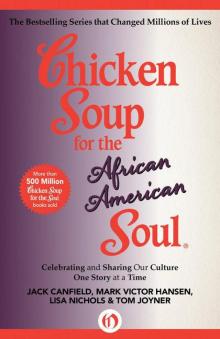 Chicken Soup for the African American Soul
Chicken Soup for the African American Soul 101 Stories of Changes, Choices and Growing Up for Kids Ages 9-13
101 Stories of Changes, Choices and Growing Up for Kids Ages 9-13 Christmas Magic
Christmas Magic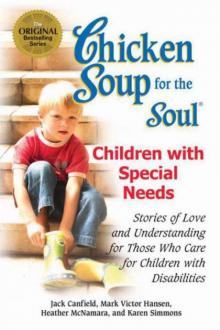 Chicken Soup for the Soul: Children with Special Needs
Chicken Soup for the Soul: Children with Special Needs Chicken Soup for the Soul: Country Music: The Inspirational Stories behind 101 of Your Favorite Country Songs
Chicken Soup for the Soul: Country Music: The Inspirational Stories behind 101 of Your Favorite Country Songs Chicken Soup for the Country Soul
Chicken Soup for the Country Soul Chicken Soup for the Recovering Soul Daily Inspirations (Chicken Soup for the Soul)
Chicken Soup for the Recovering Soul Daily Inspirations (Chicken Soup for the Soul) A 3rd Serving of Chicken Soup for the Soul
A 3rd Serving of Chicken Soup for the Soul The Book of Christmas Virtues
The Book of Christmas Virtues Chicken Soup for the Soul at Work
Chicken Soup for the Soul at Work Chicken Soup for the Soul 20th Anniversary Edition
Chicken Soup for the Soul 20th Anniversary Edition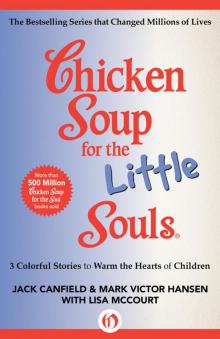 Chicken Soup for the Little Souls
Chicken Soup for the Little Souls Chicken Soup for the Soul: Reader's Choice 20th Anniversary Edition
Chicken Soup for the Soul: Reader's Choice 20th Anniversary Edition Chicken Soup for the Soul Christmas
Chicken Soup for the Soul Christmas Taste of Chicken Soup for the Teenage Soul III
Taste of Chicken Soup for the Teenage Soul III Chicken Soup for the Unsinkable Soul
Chicken Soup for the Unsinkable Soul Chicken Soup for the Preteen Soul II
Chicken Soup for the Preteen Soul II